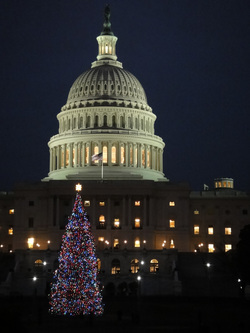
Well, grandma may or not have been run over by a reindeer, but you just got smacked by another special interest.
And at a time when government seems to be increasingly hostile to religion — even trying to force the Little Sisters of the Poor to sign a paper consenting to their workers receiving contraception coverage — isn’t it a bit ironic that Washington finds it in government’s best interest to urge you to put a real tree in your house to celebrate the birth of Christ? And you thought folks in Washington had forgotten how to pronounce the word “Christmas.”
| | This idea first gained traction more than two years ago. The Obama administration’s mistake at the time was to introduce it during the start of the holiday season. After people started to notice, and to object, the administration quickly said the Department of Agriculture “is going to delay implementation and revisit this action.” What that meant, it turns out, is that it would be reintroduced as a mandate and cleverly stuck inside a massive 949-page Farm Bill that is receiving publicity mainly for its mostly insignificant $8 billion cut in food stamps over 10 years. Call it the perfect cover. No one is thinking about Christmas right now, except maybe when the credit-card bills come. And no one — apparently not even many conservative lawmakers — are thinking about whether this tax has anything to do with the proper role of government. It doesn’t. The tax (yes, I know proponents say it really is a fee, but c’mon) would collect 15 cents for every live tree sold. In return, a board would be established to figure out ways to promote live Christmas tree sales. Sales of real trees have fallen over the years. The American Christmas Tree Association’s website says only 20 percent of trees sold last year were live. Most Americans prefer artificial trees. Let’s be honest, here. The 15 cents is no big deal and probably won’t add much to the cost of a tree. This isn’t about the money. It is, however, about the proper role of government and the free market. I’ve heard proponents say this is no different than government-supported efforts to promote beef, pork, milk or cotton. But that’s not true (even though we ought to questions those things, as well). Ads for those products promote industries with several competing businesses. Christmas tree promotion will push one type of product — fresh-cut trees — over the artificial variety. It will, in other words, be an attempt to pick winners and losers in the Christmas Tree industry by promoting live trees over the kind the market apparently prefers. The ironies here go beyond the involvement of a government in what at least some people still regard as a religious celebration. Artificial trees do not pose the fire risks associated with the real kind. While the American Christmas Tree Association says there is little difference environmentally between a real and a fake tree, people tend to hang onto their fake trees a long time, which gives them a smaller carbon footprint. It turns out the Christmas tree tax is only one part of the Farm Bill that ought to cause concern. Hundreds of millions of dollars will go toward promotion of industries and products from apples grown in Washington State to Sunkist, cling peaches and potatoes. The bill even keeps a catfish inspection office alive, despite the fact it provides the same service as the FDA and, according to the New York Times, has yet to actually look at a fish. I understand that politics requires some give and take. I’ve even been critical of the lack of compromise in recent years. But these things have nothing to do with political philosophies and everything to do with special interests. As I said two years ago on this topic, lawmakers should stick all these ideas where people put their live Christmas trees each January. |

 RSS Feed
RSS Feed

